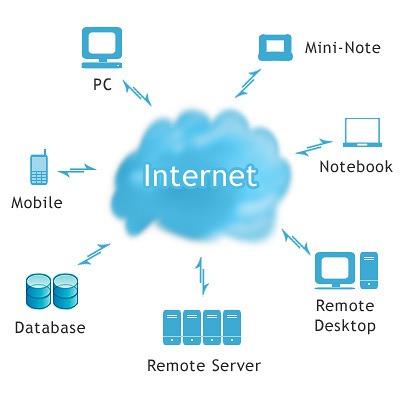Internet en la Nube es la evolución de la tecnología. Se
asemeja a las aplicaciones remotas de Internet, algo similar a lo realizado por
los proveedores de emails como Hotmail o Gmail y a algunas herramientas de
Office, como Google Cloud Connect, que permite la confección de documentos de
Office compartiendo su uso y
modificaciones con otros usuarios sin necesidad de tener el programa instalado
en nuestro ordenador.
Aunque muchas empresas aún lo siguen realizando, la tendencia es almacenar los archivos, fotos, bases de datos, informes y contactos profesionales en la nube. De esta manera, los servidores dotan a las empresas de la posibilidad de consultar cualquier documento, mail o contacto en cualquier ordenador del mundo, a cualquier hora, con solo una conexión a Internet y se libera a los empresarios de la necesidad y el coste de implementar complejas estructuras de almacenamiento en los centros de trabajo.
Sin embargo la legislación actual en temas de protección de datos y de seguridad en la sociedad de la información controlan estas actividades eficazmente.
(Autores: V. Blanco, M. T. Calderón, R. Ceacero; M. Delgado, M. Domenech, G. M. García, P. García, D. Rueda y N. Serrano.)
It’s the evolution of technology. Cloud computing resembles remote Internet applications, something similar to emails providers such as Hotmail or Gmail and some Office tools like Google Cloud Connect that allows the production of Office documents, sharing their use and modifications with other users without having the program installed.
Nowadays, these applications are widely used within the field of Social Medias like Facebook or Twitter, where users can keep in their personal spaces photos, videos, documents, etc., without taking up space on their personal computers. Each file is sent to the cloud provider, which hosts it on its servers and there are accessible from any computer anywhere.
Although many companies are still doing it, the trend is to store files, photos, databases, reports and professional contacts in the cloud. In this way, servers endow companies the ability to access any document, email or contact through any computer in the world, anytime, with just an Internet connection. In that way, employers will be freed from the need and cost of implementing complex storage structures at the workplace.
In other way, cloud computing is a trap aimed at forcing us to acquire these systems, of which we will never be owners, and they also limit us to run anything the service provider chooses. It also has the disadvantage that our files are much more vulnerable because external hosting do not always report the use made of them.
Nevertheless, actual legislation about data protection and security at the information society provide an efficient control of these activities.
(By V. Blanco, M. T. Calderón, R. Ceacero; M. Delgado, M. Domenech, G. M. García, P. García, D. Rueda and N. Serrano.)
|
|
